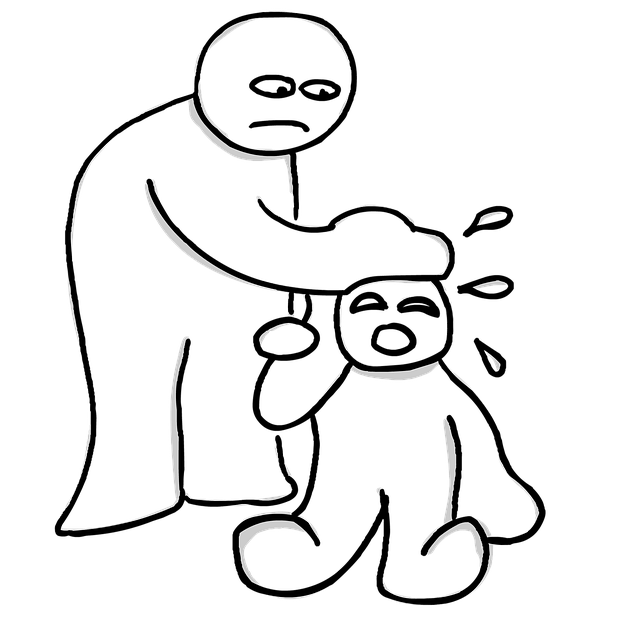Revised as of
13 Nov 2022
There is a distinction between empathy and sympathy, and it’s mostly one of distance, the metaphorical distance.
With empathy, we can put ourselves in the other person’s shoes and feel their pain.
In sympathy, we understand their pain but we don’t necessarily suffer along with them.
One way to put it in context, is that we’d empathize if we had suffered through a flood and see others trying to survive it while we’d sympathize if we see people suffering through an event we’ve never experienced.
You may also want to explore “Empathic (or Empathetic) versus Emphatic“.
Word Confusions . . .
. . . started as my way of dealing with a professional frustration with properly spelled words that were out of context in manuscripts I was editing as well as books I was reviewing. It evolved into a sharing of information with y’all. I’m hoping you’ll share with us words that have been a bête noire for you from either end.
If you found this post on “Empathy versus Sympathy” interesting, consider tweeting it to your friends. Subscribe to KD Did It, if you’d like to track this post for future updates.
| Empathy | Sympathy |
|---|---|

Older People by Bernd Müller is under the CC0 license, via Pixabay. — With my back pains, I have empathy for what these two are feeling. |

Reassuring Crying Baby by Dmitry Abramov is under the CC0 license, via Pixabay. — Awww, he’s expressing his sympathy for this child . . . |
| Part of Grammar: | |
| Noun
Plural: empathies |
Noun
Plural: sympathies |
The ability to understand and share the feelings of another
The imaginative ascribing to an object, as a natural object or work of art, feelings, or attitudes present in oneself [Cultural] Identifying oneself completely with an object or person, sometimes even to the point of responding physically, as when, watching a baseball player swing at a pitch, one feels one’s own muscles flex [Medicine] Direct identification with, understanding of, and vicarious experience of another person’s situation, feelings, and motives
|
Adjective: Expressing sympathy Noun:
Understanding between people
The fact or power of sharing the feelings of another, especially in sorrow or trouble; fellow feeling, compassion, or commiseration |
| Examples: | |
| She’s compassionate and has empathy for her daughter’s situation.
Jane is overcome with empathy over Jenny’s bad luck. Such a metaphor betrays a complete lack of understanding, of empathy with Victorian culture. There is a frightening lack of empathy and of understanding of the condition of the elderly. The money will be used to fund an initiative designed to help offenders develop empathy with their victims. All art criticism is necessarily subjective, but such complete empathy with an artist is rare. By means of empathy, a great painting becomes a mirror of the self. Sharing stories is a powerful way to promote empathy. I’ll bet any man, watching an actor on-screen get kneed in the groin, will empathize with his pain. Medical educators and professional bodies increasingly recognize the importance of empathy, but they define empathy in a special way to be consistent with the overarching norm of detachment (Halpern). |
Adjective: We should send a sympathy card. Oh, please, you’re getting sympathy votes. Noun: All Tony’s friends joined in sending their sympathies to his widow, Jean. The special sympathy between the two boys was obvious to all. His sympathies lay with his constituents. It’s hard to tell where your sympathies lie. He viewed the plan with sympathy and publicly backed it. I have some sympathy for this view. Repairs had to be in sympathy with the original structure. The magnetic field oscillates in sympathy. |
| Derivatives: | |
| Adjective: empathetic Adverb: empathetically Noun: empathist |
Adjective: sympathetic Adverb: sympathetically, sympathizingly Noun: nonsympathy, presympathy, supersympathy, sympathism, sympathist Verb: sympathize |
| History of the Word: | |
| Early 20th century from the Greek empatheia from em- (in) + pathos (feeling) translating the German Einfühlung. | Old English loan-translation of sympathy was efensargung.
At first, sympathy was a magical notion in reference to medicines that heal wounds when applied to a cloth stained with blood from the wound. By the 1570s, from the Middle French sympathie meaning affinity between certain things, from the Late Latin sympathia meaning community of feeling, sympathy, from the Greek sympatheia, which is from sympathes meaning having a fellow feeling, affected by like feelings, which is from sun- (with) + pathos (feeling). By the 1590s, it took on the meaning of conformity of feelings. By the 1660s, the sense of fellow feeling was first attested. |
C’mon, get it out of your system, bitch, whine, moan . . . which words are your pet peeves? Also, please note that I try to be as accurate as I can, but mistakes happen or I miss something. Email me if you find errors, so I can fix them . . . and we’ll all benefit!
Satisfy your curiosity about other Word Confusions on its homepage or more generally explore the index of self-editing posts. You may also want to explore Book Layout & Formatting Ideas, Formatting Tips, Grammar Explanations, Linguistics, Publishing Tips, the Properly Punctuated, Writing Ideas and Resources, and Working Your Website.
Resources for Empathy versus Sympathy
Apple Dictionary.com
Bariso, Justin. “There are Actually 3 Types of Empathy. Here’s How They Differ — and How You Can Develop Them All.” Inc. 19 Sept 2018. Web. n.d. <https://www.inc.com/justin-bariso/there-are-actually-3-types-of-empathy-heres-how-they-differ-and-how-you-can-develop-them-all.html>.
Dictionary.com: sympathy
Halpern, Dr Jodi. “What is Clinical Empathy?” PubMed Central. 18 Aug 2003. Web. n.d. <https://www.ncbi.nlm.nih.gov/pmc/articles/PMC1494899/>.
Oxford Dictionaries: empathy
Pinterest Photo Credits:
Chief Pfingston Laid to Rest at Arlington was photographed by U.S. Air Force Senior Airman Rusti Caraker and is in the public domain, via the US Air Force. The image was cropped.


